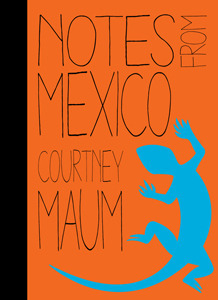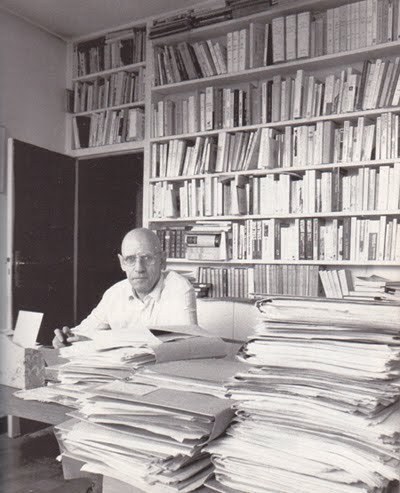Emily M. Danforth's Blog, page 59
February 12, 2013
Courtney Maum’s excellent, 2012 contest-winning (as judged...

Courtney Maum’s excellent, 2012 contest-winning (as judged by the incredible Maud Casey) prose chapbook--NOTES FROM MEXICO—is now available from The Cupboard. It’ll set you back only $5, folks (which, incredibly, includes shipping).
What you should know: Told in 21 brief chapters, Notes from Mexico is a book, as Maud Casey says, that’s “wickedly funny but never rests on its cleverness. Instead, the wry sensibility walks a razor’s edge; danger lurks in the taut language, the refreshingly strange observations, the poignantly tippy searching. Like the songwriter Dory Previn, about whom the narrator says, ‘no one gave enough respect,’ this story has an eye for the unsettling, resonant detail and the winning oddness of the world, as well as a lovely, fresh agility when it comes to wrangling with behemoths like marriage and having, or not having, children. Most of all, the pleasure here is in the fleetness of this voice and its deft ability to reside in, and to illuminate, uncertainty, for which its author deserves an enormous amount of respect.”
http://www.thecupboardpamphlet.org/catalogue/notes-from-mexico/
February 11, 2013
Incredible, unbelievable, truly fantastic news: The Miseducation...

Incredible, unbelievable, truly fantastic news: The Miseducation of Cameron Post won the 2012 Montana Book Award! And it’s also absolutely worth noting that the list of honor books for this award includes David Abrams’ wonderful (comic) novel FOBBIT; Joe Wilkins’ excellent memoir THE MOUNTAIN AND THE FATHER; and Erin Saldin’s incredible YA novel THE GIRLS OF NO RETURN.
Awesome awesomeness all around.
More info here: http://www.montanabookaward.org/
exhibition-ism:
These photographs from Diane Meyer have been...








These photographs from Diane Meyer have been distorted and pixelated like never before, through hand-stitched embroidery.
likeafieldmouse:
Sandy Smith - Mauritian Sunset (2005-6)
The Talent of the Room (excerpt)--essay by Michael Ventura
Writing is something you do alone in a room. Copy that sentence and put it on your wall because there’s no way to exaggerate or overemphasize this fact. It’s the most important thing to remember if you want to be a writer. Writing is something you do alone in a room.
Before any issues of style, content or form can be addressed, the fundamental questions are: How long can you stay in that room? How many hours a day? How do you behave in that room? How often can you go back to it? How much fear (and, for that matter, how much elation) can you endure by yourself? How many years — how many years — can you remain alone in a room?
I know people who, when young, had wonderful talents: prose of grace and resonance that came without effort, sentences that moved intelligently with that crucial element of surprise, never concluding quite where one expected, so that you were always eager to read the next and the next. Promising work as they say. But to write anything that would keep the promise, to go beyond the letters, verse and stories of their youth, written with such enthusiasm, friends and teachers praising them, little magazines publishing them — to take the next step meant that they would have to sit alone in a room for years.
Some sat just for weeks. Some lasted months. Some kept saying that next summer, or next winter, or after they graduated, or when they moved to Europe (which they never did), or when they got a grant, or when they weren’t so busy, or when they could afford a place that gave them the space (because they needed an actual room; it couldn’t be just the bedroom or the kitchen)… sometime in the foreseeable but not the immediate future, then they’d write the novel or complete that sequence of poems.
A few of these talented people would even arrange the room. A good desk, a clean well-oiled typewriter (a computer now), the paper, the pencils, the stereo, maybe a hot plate. But after the room is ready you have to sit in it. For a very long time. (Sometimes it takes weeks or months even to begin writing.) And that’s the talent they didn’t have.
There’s no harm or blame in not having a talent. But it is very painful to have some of the talents, almost all of the talents, except the one you really need.
…
If you’re Sharon Doubiago, your room is your van; if you’re the young Ernest Hemingway, your room is a cafe table; if you’re Emily Dickinson, your room is your garden; if you’re Marcel Proust, you write in bed; if you’re William Faulkner, you compose As I Lay Dying in six weeks in a humid shack while you work days in a factory (or was it work nights and write days?). But whoever you are, whatever shape it takes, that room is the center of your life and it’s very crowded. Everything you are and everything you’re not backs you up against the wall and stares at you. You stare back. And eventually you get some writing done.
The thing about the room is this: it’s likely you’ll have to remain there for years before you even know whether or not you’re any good — and it may be years more before anyone else knows. Because you can have the talent of the room and can spend years there but still not be much of a writer. Or twenty years can go by and you are good, but you don’t get published; or you get published, but nobody notices; or they notice, but they hate it; or you’re a lousy writer, but they love it and you get rich. Whatever. The only thing you know you’ll have twenty years down the line is the experience of the room — how you behaved, what you felt, what you thought, what you dared, what you fled, how you lived life, how life lived you, alone, in that room.
Excerpted from the wonderful MICHAEL VENTURA essay “The Talent of the Room.” (LA Weekly, 1993.) As re-posted with his permission on Kelley Eskridge’s blog, here: http://kelleyeskridge.com/other-things/the-talent-of-the-room/
Read more of Michael Ventura’s thoughts about writing creatively/workshop/sticking-with-it, here: http://www.austinchronicle.com/columns/2007-05-25/477922/
"[Did] I write for four or five hours of focused time, when I did not leave my desk, didn’t find some..."
- Karen Russell (via mttbll)
February 9, 2013
"Stories aren’t about things. Stories are things.
Stories aren’t about actions. Stories are, unto..."
Stories aren’t about things. Stories are things.
Stories aren’t about actions. Stories are, unto themselves, actions.
- Bret Anthony Johnston (via mttbll)
"I will confess that, to my appalled surprise, I find them strangely heartbreaking."
- The Recently Revealed, Nude Self-Portraits of George W. Bush: A Critique | Vanity Fair (via feministlibrarian)
picadorbookroom:
For some people, writing a book is always...

For some people, writing a book is always taking a risk, for example the risk of not finishing it. When you know in advance where you want to get to, a dimension of the experience is missing, which consists precisely in writing a book while running the risk of not getting to the end.
—Michel Foucault
What our slice of PVD looks like right now, having found Nemo.




What our slice of PVD looks like right now, having found Nemo.








